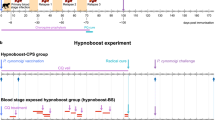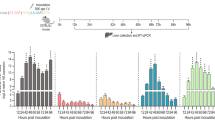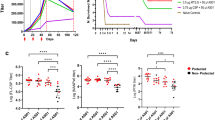Abstract
Immunization attempts using a variety of plasmodial preparations have identified several developmental stages and vaccination procedures which can protect against malaria1–3. These indicate that immunoprophylaxis against malaria may also be possible in man. The immune response to these vaccines has only been investigated in adult animals, but in countries where malaria is prevalent, children are most at risk of developing lethal infections. Thus we must ask whether vaccination against malaria would be effective when applied early in life. Here we report the use of intramuscular (i.m.) immunization of very young mice with radiation-attenuated sporozoites of Plasmodium berghei as a vaccination procedure, and that these animals can be effectively protected against sporozoite challenge. This approach avoids the intravenous (i.v.) immunization, which although highly effective in adult animals, is barely acceptable for use in man. Another important aspect of the host–parasite relationship in endemic areas is the role of immunity transmitted congenitally from mother to infants. We therefore investigated whether sporozoite-immunized adult female mice could transfer this immunity to their litters. It was found that the offspring acquired antisporozoite antibodies from their mothers through the milk. Furthermore, most of these offspring resisted challenge by infective sporozoites.
This is a preview of subscription content, access via your institution
Access options
Subscribe to this journal
Receive 51 print issues and online access
$199.00 per year
only $3.90 per issue
Buy this article
- Purchase on Springer Link
- Instant access to full article PDF
Prices may be subject to local taxes which are calculated during checkout
Similar content being viewed by others
References
Mitchell, G. H., Butcher, G. A. & Cohen, S. Immunology 29, 397–407 (1975).
Gwadz, R. W. & Green, I. J. exp. Med. 148, 1311–1323 (1978).
Nussenzweig, R. S. Int. J. nucl. Med. Biol. 7, 89–96 (1980).
Orjih, A. U. & Nussenzweig, R. S. Am. J. trop. Med. Hyg. 29, 343–347 (1980).
Spitalny, G. L. & Nussenzweig, R. S. Proc. helminth. Soc. Wash. 39, 506–514 (1972).
Maegraith, B. G., Deegan, T. & Sherwood Jones, E. Br. med. J. 2, 1382–1384 (1952).
Hawking, F. Br. med. J. i, 1201–1202 (1953).
Beer, A. E., Billingham, R. E. & Head, J. J. invest. Derm. 63, 65–74 (1974).
Trentin, J. J., Gallagher, M. T. & Priest, E. L. Transplantn. Proc. 9, 1473–1475 (1977).
Potocnjak, P., Yoshida, N., Nussenzweig, R. & Nussenzweig, V. J. exp. Med. 151, 1504–1513 (1980).
Author information
Authors and Affiliations
Rights and permissions
About this article
Cite this article
Orjih, A., Cochrane, A. & Nussenzweig, R. Active immunization and passive transfer of resistance against sporozoite-induced malaria in infant mice. Nature 291, 331–332 (1981). https://doi.org/10.1038/291331a0
Received:
Accepted:
Issue Date:
DOI: https://doi.org/10.1038/291331a0
This article is cited by
-
Nitro-BT reduction test as a circulating leukocyte function test in mice with experimental malaria
Bulletin of Experimental Biology and Medicine (1988)
Comments
By submitting a comment you agree to abide by our Terms and Community Guidelines. If you find something abusive or that does not comply with our terms or guidelines please flag it as inappropriate.



